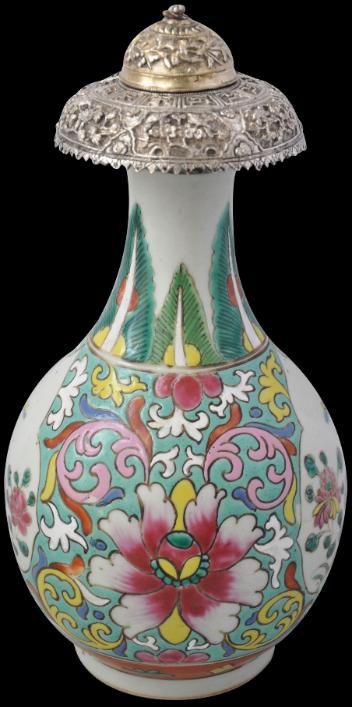
Peranakan Silver Chinese Kendi
Chinese Polychrome Kendi with Peranakan Chinese Parcel-Gilt Silver Mounts
China & Indonesia, possibly Java or Makassar
19th century
height: 27cm
This Chinese exportware, polychrome porcelain vase is in the form of a kendi – a drinking water vessel specifically made for the Islamic market, particularly the Southeast Asian Islamic markets of Indonesia and Malaysia.
It is enamelled in bright hues with multi-coloured, flowing tendril motifs against a turquoise-green ground and with a stylised cloud cartouche on either side decorated with flowers and butterflies against a plain ground.
The motifs of the silver mounts are overtly and typically
peranakan Chinese.
The top of the
kendi has a wide silver rim that is repoussed with six panels of humming birds amid Chinese flowers including pomegranates, and a border of Buddhistic reverse swastikas. The rim finishes with a saw-tooth edge. The actual lid sits in the rim. It is of gilded (gold-plated) silver that is repoussed with a wide foliage band. The lid is surmounted by a bud finial and a silver wire star attachment from which suspended is a fine silver chain that leads to a small, domed floral cover for the spout from which water was emitted for drinking.
The silver mounts obviously are of local Chinese workmanship, possibly for an indigenous Javanese or similar client, or more likely, for a
peranakan (localised) Chinese client who was acculturated with indigenous ways. The silverwork suggests a Javanese origin or perhaps Makassar (formerly known as Ujung Pandang) in South Sulawesi where there was a vibrant peranakan trading community.
Kendis made in China with silver mounts applied in Southeast Asia appear in museum collections in Malaysia and Indonesia. An example is illustrated in Miksic (2007).
References
Miksic, J., Icons of Art: The Collections of the National Museum of Indonesia, BAB Publishing, 2007.
Provenance
UK art market
Inventory no.: 1338
SOLD






